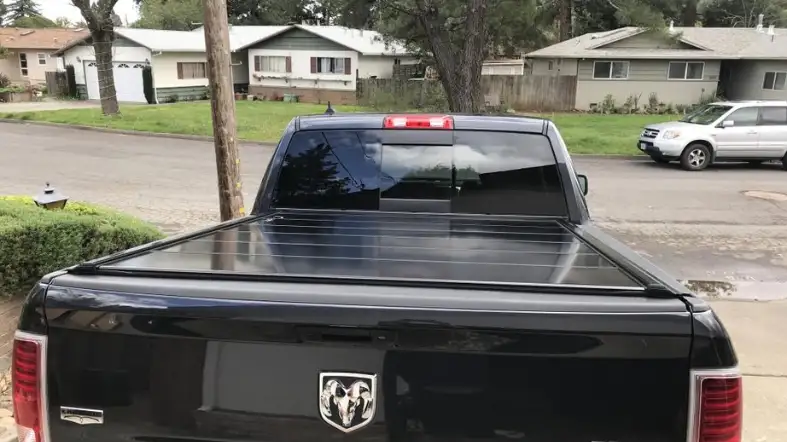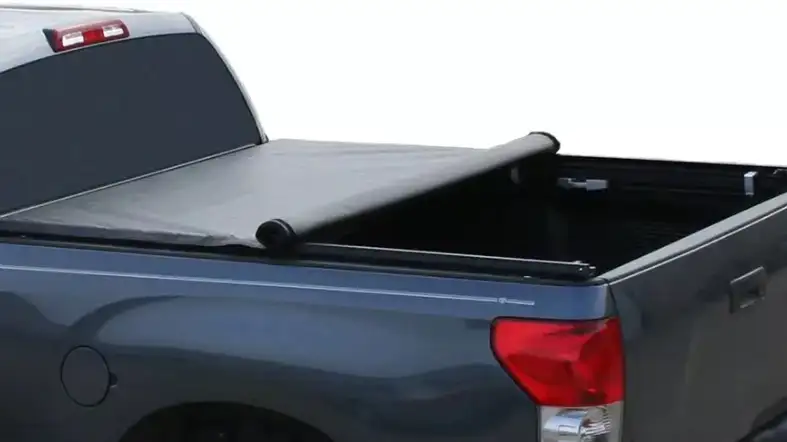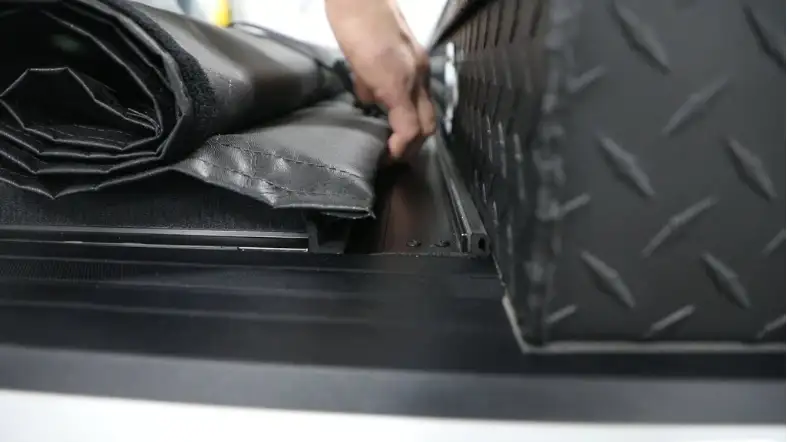Are you considering getting a tonneau cover for your truck, but concerned about its weight? Wondering how much a tonneau cover actually weighs?
Look no further! In this article, we’ll delve into the weight factors of tonneau covers and provide you with valuable insights.
Are tonneau covers heavy and bulky, or are they lightweight and easy to handle and tighten? Let’s uncover the truth and help you make an informed decision.

How much does a tonneau cover weigh?
A tonneau cover’s weight depends on its type and size. Soft tonneau covers for mid-size trucks weigh around 15-30 lbs, while full-size truck covers weigh 20-40 lbs. Hard tonneau covers made of aluminum or fiberglass weigh between 50-110 lbs. Truck caps or toppers weigh 170-250 lbs.
| Type | Material | Construction | Size | Weight |
|---|---|---|---|---|
| Soft tonneau cover | Canvas or vinyl | Single piece | Mid-size truck | 15-30 lbs |
| Soft tonneau cover | Canvas or vinyl | Single piece | Full-size truck | 20-40 lbs |
| Hard tonneau cover | Aluminum | Multiple panels | Mid-size truck | 50-70 lbs |
| Hard tonneau cover | Aluminum | Multiple panels | Full-size truck | 70-100 lbs |
| Hard tonneau cover | Fiberglass | Multiple panels | Mid-size truck | 60-80 lbs |
| Hard tonneau cover | Fiberglass | Multiple panels | Full-size truck | 80-110 lbs |
| Truck cap or topper | Fiberglass or aluminum | Single piece | Mid-size truck | 170-200 lbs |
| Truck cap or topper | Fiberglass or aluminum | Single piece | Full-size truck | 200-250 lbs |
Factors Affecting Tonneau Cover Weight
Let’s delve into the key elements that influence the weight of a tonneau cover:
Material
Tonneau covers can be made from various materials such as aluminum, fiberglass, vinyl, or canvas.
Each material has its own weight characteristics. Aluminum covers tend to be lightweight, while fiberglass covers are usually heavier.
Design and Construction
The design and construction of the tonneau cover also impact its weight.
Some covers have a simpler, streamlined design with minimal hardware, making them lighter.
On the other hand, covers with complex mechanisms, additional reinforcements, or built-in storage systems may weigh more.
Type
Tonneau covers come in different types, such as soft roll-up, folding, retractable, or hard tri-fold covers.
The type you choose can significantly affect weight. Soft covers are generally lighter than their hardcover counterparts.
Size
The size of the tonneau cover is a crucial factor. Larger covers naturally weigh more due to the additional materials required to provide coverage for a larger truck bed.
Consider the dimensions of your truck bed when determining the weight of the tonneau cover.
Additional Features
Some tonneau covers offer extra features like built-in locks, LED lights, or aerodynamic designs. These added features can contribute to the overall weight of the cover.
Impact of Tonneau Cover Weight on Fuel Efficiency

When it comes to maximizing fuel efficiency for your vehicle, every little detail counts.
In this discussion, we will explore the impact of tonneau cover weight on your vehicle’s fuel efficiency.
By understanding this relationship, you can make an informed decision when selecting a tonneau cover for your vehicle.
Recognizing the importance of weight on fuel efficiency
Weight plays a significant role in the fuel efficiency of any vehicle. The more weight a vehicle carries, the more fuel it requires to move.
This concept applies to tonneau covers as well. Even though tonneau covers are relatively lightweight, their weight can still have an impact on your vehicle’s fuel consumption.
The key is to find the right balance between the benefits of a tonneau cover and its effect on fuel efficiency.
Considering the different types of tonneau covers
Tonneau covers come in various materials and designs, and each type has a different weight.
It’s important to understand the options available before making a decision. Here are a few common types of tonneau covers and their approximate weight ranges:
Soft Roll-Up Tonneau Covers

These covers are made of lightweight vinyl or fabric material and typically weigh between 20 to 40 pounds.
Hard Folding Tonneau Covers
These covers are constructed from sturdy materials like aluminum or fiberglass and tend to be heavier, ranging from 40 to 100 pounds.
Retractable Tonneau Covers
These covers often feature a metal or aluminum construction and can weigh between 60 to 150 pounds, depending on the model and design.
Evaluating the impact on fuel efficiency
While the weight of a tonneau cover may seem insignificant, it can have a noticeable effect on your vehicle’s fuel efficiency over time.
Here’s how the weight of a tonneau cover can impact fuel consumption:
Increased Aerodynamic Drag
The addition of a tonneau cover alters the aerodynamics of your vehicle.
Heavier tonneau covers can create more drag, making it harder for the vehicle to move through the air. This increased resistance leads to a decrease in fuel efficiency.
Additional Weight
The weight of the tonneau cover adds to the overall load that your vehicle must carry.
The heavier the cover, the more weight your vehicle has to bear, resulting in increased fuel consumption.
Mitigating the impact on fuel efficiency
While the weight of a tonneau cover may have some effect on fuel efficiency, there are measures you can take to mitigate this impact:
Choosing Lightweight Materials
Opt for tonneau covers made from lighter materials like vinyl or fabric. These options provide protection while minimizing the additional weight on your vehicle.
Streamlined Design
Look for tonneau covers with aerodynamic designs that minimize drag.
Some covers are specifically engineered to reduce wind resistance, which can help improve fuel efficiency.
Proper Maintenance
Regularly clean and maintain your tonneau cover to ensure it remains in optimal condition.
Any damage or wear that affects the cover’s ability to fit tightly or maintain its shape can increase aerodynamic drag and negatively impact fuel efficiency.
How Tonneau Cover Material Influences Weight?

When it comes to tonneau covers, the choice of material plays a crucial role in determining the overall weight of the cover.
The weight of a tonneau cover is an important consideration, as it directly impacts fuel efficiency, cargo capacity, and ease of use.
We will delve into the various tonneau cover materials and explore how each one influences the weight of the cover.
By understanding these factors, you can make an informed decision when selecting the right tonneau cover material for your vehicle.
Aluminum Tonneau Covers
Aluminum is a popular choice for tonneau covers due to its lightweight nature.
These covers are typically constructed from aluminum panels, which are strong and durable while being relatively lightweight.
The use of aluminum in tonneau covers helps to reduce the overall weight of the cover, making it easier to handle and install.
Furthermore, the lighter weight of aluminum tonneau covers contributes to improved fuel efficiency, as it minimizes the additional weight added to the vehicle.
Fiberglass Tonneau Covers
Fiberglass is another commonly used material for tonneau covers.
While fiberglass offers excellent durability and protection for your cargo, it tends to be heavier compared to aluminum covers.
The weight of fiberglass tonneau covers is primarily due to the thicker construction and added reinforcement needed to ensure strength.
Consequently, the heavier weight of fiberglass covers may slightly reduce fuel efficiency and make installation and removal a bit more challenging.
Vinyl Tonneau Covers
Vinyl tonneau covers are lightweight options that provide good protection for your truck bed, particularly with a bed rail.
Vinyl is a synthetic material that is known for its lightweight and flexible properties.
These covers are typically made from a combination of vinyl fabric and aluminum frames.
The lightweight nature of vinyl makes it easier to handle and install compared to fiberglass covers.
Additionally, the reduced weight of vinyl tonneau covers helps to minimize the impact on fuel efficiency.
Roll-Up and Folding Tonneau Covers
Roll-up and folding tonneau covers are available in various materials, including aluminum, vinyl, and fabric.
These covers offer convenience and versatility, allowing you to easily access your truck bed.
The weight of roll-up and folding tonneau covers can vary depending on the chosen material.
For example, aluminum roll-up covers tend to be lighter compared to vinyl or fabric options.
Consider your specific needs and preferences when selecting a roll-up or folding tonneau cover material, as it will impact the overall weight.
Installation and Handling Tips for Different Weight Categories
Installing and handling lightweight tonneau covers requires attention to detail and proper techniques to ensure a successful and hassle-free experience.
Here are some tips to help you with the installation and handling of lightweight tonneau covers:
Secure Mounting
Begin by ensuring that the mounting hardware provided with the tonneau cover is securely attached to your truck bed.
Follow the manufacturer’s instructions carefully to properly position and tighten the mounting clamps or brackets.
This step is crucial as it ensures a stable and secure installation of the lightweight cover.
Gentle Handling
When handling lightweight tonneau covers, it’s important to exercise caution and avoid applying excessive force.
While the covers are designed to be lightweight for easy handling, mishandling can lead to damage or misalignment.
Always lift and carry the cover with care, making sure not to bend or twist it unnecessarily.
Collaborative Approach
If your lightweight tonneau cover is particularly large or cumbersome, consider enlisting the help of a friend or family member during installation.
Having an extra pair of hands can make the process smoother and reduce the risk of accidents or damage.
Proper Alignment
During installation, pay close attention to aligning the tonneau cover with your truck bed.
Ensure that it sits flush and evenly across the bed, without any gaps or misalignments.
This proper alignment will not only enhance the appearance of your truck but also prevent potential water leaks or debris from entering the bed.
Heavier Tonneau Covers
Heavier tonneau covers require additional considerations during installation and handling due to their increased weight.
tips to ensure a safe and effective installation process
Adequate Support
Before starting the installation, make sure you have a stable and secure work area.
If possible, use a workbench or elevated surface to support the tonneau cover during the installation process.
This will help prevent unnecessary strain on your back and make it easier to align and secure the cover properly.
Use Mechanical Assistance
Given the weight of heavier tonneau covers, it may be beneficial to use mechanical assistance such as a lift or hoist system.
These tools can help you safely lift and position the cover onto your truck bed, reducing the risk of injuries and making the installation process more manageable.
Follow the Manufacturer’s Guidelines
Heavy tonneau covers often come with specific instructions and recommendations from the manufacturer regarding installation and handling.
Be sure to carefully read and follow these guidelines to ensure a proper fit and avoid any potential damage to the cover or your vehicle.
Regular Maintenance
Once the heavier tonneau cover is installed, it’s important to perform regular maintenance to ensure its longevity.
This may include periodic tightening of mounting hardware, lubrication of moving parts, and inspection for any signs of wear or damage.
By taking care of your tonneau cover, you can extend its lifespan and maintain its functionality.
FAQs
Are All Tonneau Covers The Same Weight?
No, tonneau covers come in different materials and designs, resulting in varying weights.
Aluminum covers are generally lighter, while fiberglass covers tend to be heavier.
Do Tonneau Covers Add Significant Weight To My Truck?
Tonneau covers typically add minimal weight to your truck, especially when considering the overall vehicle weight.
However, heavier covers may have a slight impact on fuel efficiency.
What Is The Weight Difference Between Aluminum And Fiberglass Tonneau Covers?
Aluminum tonneau covers are generally lighter than fiberglass covers.
Aluminum covers can weigh around 20 to 50 pounds, while fiberglass covers can range from 60 to 150 pounds.
Do Vinyl Tonneau Covers Weigh Less Than Other Materials?
Yes, vinyl tonneau covers are lighter compared to materials like aluminum or fiberglass.
They usually weigh between 20 to 40 pounds, making them a lightweight option.
Can The Weight Of A Tonneau Cover Affect My Truck’s Payload Capacity?
Tonneau covers have minimal impact on a truck’s payload capacity.
The weight of the cover itself is unlikely to significantly affect the payload capacity of your vehicle.
How Can I Determine The Weight Of A Specific Tonneau Cover Model?
To find the weight of a specific tonneau cover model, refer to the manufacturer’s specifications or product descriptions.
This information is typically provided by the manufacturer and can help you determine the weight before purchasing.
Final Words
Discovering the weight of a tonneau cover allows you to make an informed decision based on your specific needs.
By understanding that tonneau cover weight can vary based on materials like aluminum, fiberglass, or vinyl, you can choose a lightweight option that won’t burden your truck’s payload capacity.
Consider the weight differences and find the perfect tonneau cover that strikes the ideal balance between protection and convenience for you.
